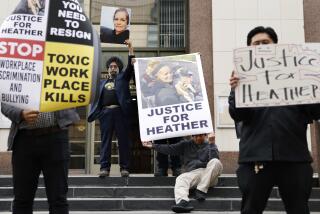Ritter’s Resignation Is a Wake-Up Call
- Share via
The decision by senior U.N. inspector Scott Ritter to resign reflects a growing sense of frustration and bitterness among the men and women from several countries working to disarm Iraq of its most dangerous weapons. They feel abandoned by the international community, which is suffering from “crisis fatigue.”
With intrusive inspections in abeyance, Baghdad may now rebuild its deadly arsenal, nullifying the accomplishments of the past seven years. If that happens, Iraqi President Saddam Hussein will have won the Gulf War.
The creation of the U.N. Special Commission (UNSCOM) in the aftermath of the Gulf War was an unprecedented experiment: an international scientific and technical agency devoted to disarming a defeated aggressor-state that already had used chemical weapons on a large scale and had massive efforts under way to acquire nuclear and biological arms. Backed by the U.N. Security Council, the inspectors had the right to inspect sites anywhere in Iraq, any time, and to destroy whatever proscribed weapons they were able to uncover. Indeed, UNSCOM has demonstrated that persistent inspections, backed up by timely intelligence from member countries, can be highly effective. The inspectors have been able to ferret out illicit activities--such as the large-scale production and weaponization of deadly VX nerve agent--that Iraq had disavowed for years.
Yet these achievements have not come easily. The inspectors have labored in the face of a massive, systematic effort by the Iraqi security services to conceal evidence of weapons programs. Illicit arms, materials, equipment and documents have been shuttled around the country to remain one step ahead of the inspectors.
Enter Scott Ritter, who conceived of and led a special UNSCOM operation to target the Iraqi concealment mechanism itself. This strategy was daring and high risk, since it involved investigating the most secretive units directly linked to Hussein, the Special Security Organization and the Special Republican Guard. UNSCOM’s aggressive plan to target the Iraqi concealment mechanism struck a raw nerve, leading Saddam to expel the American inspectors and to provoke a military showdown rather than allow inspections to continue.
In the past, unarmed U.N. inspectors faced down Iraqi soldiers with Kalashnikovs, secure in the knowledge that the U.N. Security Council was behind them. But whenever the council hesitated or equivocated, as it did in February when U.N. Secretary-General Kofi Annan brokered a short-lived deal with Hussein, Iraq has exploited this weakness. Baghdad’s reaction to the anti-concealment effort was a sign that UNSCOM’s new strategy was working, and it may have backfired politically by forcing an increasingly divided U.N. Security Council to support a more confrontational approach.
In recent months, however, even the U.S. government has cautioned against such high-risk though potentially high-payoff inspections. A few weeks ago, UNSCOM called off some sensitive site inspections that inspectors believed would have yielded critical information about Iraq’s concealed weapons programs.
The past seven years have seen a protracted battle of will and wits between the U.N. inspectors and the Iraqi authorities. The inspectors have persevered in the face of harassment, intimidation and even physical violence. They are true heroes, unarmed soldiers fighting on the front lines of nonproliferation, and deserve the unqualified support of the U.S. government. Ritter’s departure will weaken UNSCOM, at least in the short term, but it should serve as a wake-up call for the international community.
More to Read
Sign up for Essential California
The most important California stories and recommendations in your inbox every morning.
You may occasionally receive promotional content from the Los Angeles Times.













